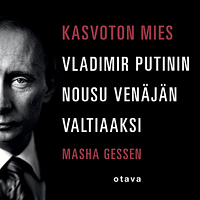Take a photo of a barcode or cover
I love Masha Gessen. They're one of the only authors I've ever read whose work for me has not been hampered by the audiobook format, and one of the only journalists who can claim the skill of actually weaving together the individual lives of citizens and the great tapestry of culture and history. I'm always confused by people who slam their work for "anti-Russian" or "anti-Putin" bias. This is someone who, as a child, had to flee the USSR with their family due to anti-Semitism, then returned to Russia to document war crimes, and was again forced to flee as an adult for their political activism and for daring to raise children while being queer. Somehow, we are perfectly fine with dominant voices (ie, straight, white, Christian, male) adding their own personal stories into any journalistic or cultural narrative, but when anyone outside the norm dares to try it, it's "biased" and "detracts from the narrative." Gessen does not pretend to be unbiased--nor would you, if you had to leave your country for the crime of simply existing.
In my opinion, Gessen's research and judgment here is spot-on. However, because this book was released after the 2012 protests, the ending, while written to be slightly uplifting, comes off as even more foreboding, as we currently watch Putin tighten his grip on power even further.
In my opinion, Gessen's research and judgment here is spot-on. However, because this book was released after the 2012 protests, the ending, while written to be slightly uplifting, comes off as even more foreboding, as we currently watch Putin tighten his grip on power even further.
Recommended by Rob. Check our catalog: https://encore.cooklib.org/iii/encore/search/C__Sman%20without%20a%20face%20gessen__Orightresult__U?lang=eng&suite=gold
An overview of Putin's life and career up through around 2010, when the book ends on a note of hope for the Russian people. (Dashed, of course.) Because Gessen writes a lot about daily life as she lived it in Russia, this reads as an on-the-ground account of life in Russia more than as a traditional biography.
While it's well enough written, it's nothing especially newsworthy. If you somehow thought Putin was an interesting or fair person, you needed to read this book. If you thought he was a thug, then you didn't need a whole book to reaffirm what you thought.
The Man Without a Face: The Unlikely Rise of Vladimir Putin is another example of a book which is not quite about what its title implies. Gessen documents many of the ways in which Russia under Putin is breathtakingly corrupt—how a man who's been a government official all his life has amassed a fortune of US$40bn is interesting to contemplate—and is (mostly) convincing in her argument that Putin presides over a state-authorised regime of murder, blackmail and oppression. Yet we actually find out very little about how he came to be the person holding supreme power in Russia—perhaps not surprisingly, given that Gessen has no access to Putin and I'm sure that few people in Putin's inner circles would be willing or able to speak to her. This means that several aspects of Putin's rise were just as opaque to me on finishing the book as they were when I began it, and the kinds of armchair psychoanalysis which Gessen employs are not always very interesting. Still, this is undeniably a very brave book, and provides an interesting perspective from someone who is both an insider (Russian) and an outsider (journalist, political activist, spent much of childhood in the U.S., Jewish, lesbian) in contemporary Russian society.
(I listened to this in audiobook form, and the narrator was really irritating. Particularly towards the beginning, she spoke in an affected, overly emphatic, quavering voice, and used a pretty awful faux-Russian accent to voice all the direct quotes. I mean, I couldn't distinguish a Muscovite accent from a St Petersburg one if you paid me, but I do know the appropriate pronunciation of Vladimir, Ingushetia, Angela Merkel (!) and so on.)
(I listened to this in audiobook form, and the narrator was really irritating. Particularly towards the beginning, she spoke in an affected, overly emphatic, quavering voice, and used a pretty awful faux-Russian accent to voice all the direct quotes. I mean, I couldn't distinguish a Muscovite accent from a St Petersburg one if you paid me, but I do know the appropriate pronunciation of Vladimir, Ingushetia, Angela Merkel (!) and so on.)
Maybe it was necessary, but the telling of parts of the tale was confusing. This may have just been caused by the book's subject, but it made parts difficult to follow.
informative
reflective
sad
medium-paced
challenging
informative
medium-paced





